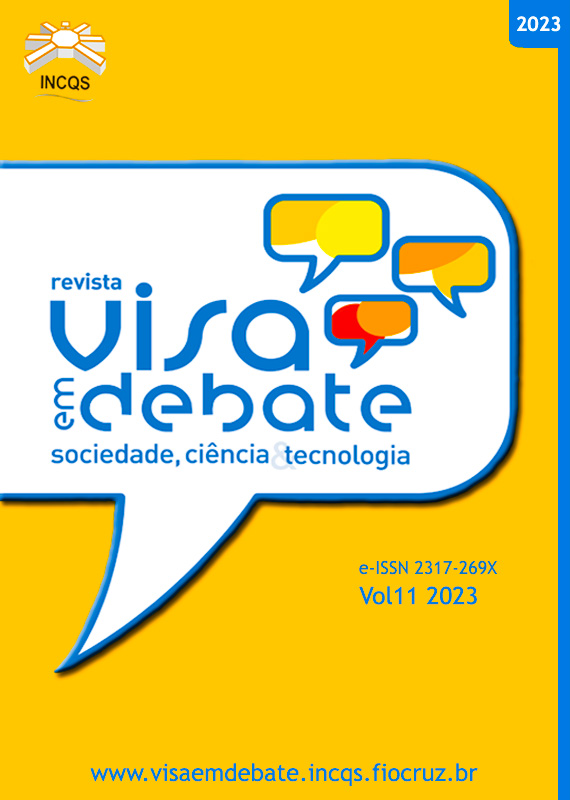Impact of the COVID-19 pandemic on the functioning of the human milk bank of a maternity hospital in the city of Rio de Janeiro, Brazil
Vigil Sanit Debate, Rio de Janeiro, 2023, v.11: e02128 | Published on: 03/10/2023
DOI:
https://doi.org/10.22239/2317-269x.02128Keywords:
Human Milk Bank, Breastfeeding, Quality of Health CareAbstract
Introduction: Human milk bank is a specialized service, linked to a maternal/or children’s hospital, responsible for actions to promote, protect and support breast milk and execution of collection, processing, quality control and distribution of human milk. Like most health services, this specialized service was impacted during the COVID-19 pandemic. Objective: To know the impact of the COVID-19 pandemic on the Human Milk Bank of Maternidade Leila Diniz, Rio de Janeiro, providing the necessary knowledge to managers to expand strategies for capturing human milk in addition to the protection and promotion of Breastfeeding. Also, to describe the strategies used to promote the uptake of human milk (HM) during the COVID-19 pandemic. Method: The individual indicators were the number of individual appointments, number of home visits, number of donors, number of recipients, volume of household collections, volume of microbiological milk, number of individuals examined for milk, number of household collections, Dornic and volume of pasteurized human milk. Data involved the period from February 2019 to March 2021, and was related to the services carried out by the HMB of the Leila Diniz Maternity Hospital, Rio de Janeiro. Indicators referring to the periods before and during the COVID-19 pandemic were compared. Results: It was observed that in the period during the pandemic, despite the reduction in the number of individualized visits at the HMB, there was a substantial increase in home visits, which promoted a greater volume of LH collected and distributed, and consequently a greater number of LH quality analyses (microbiological, crematocrit and Dornic acidity) were performed as well as a greater volume of LH was pasteurized. Conclusions: It is concluded that, even in a time of pandemic and social isolation, it was possible, safely and with quality, to care for newborns who are premature, or who have low birth weight in the Neonatal Unit.
Downloads
Downloads
Published
Issue
Section
License
Copyright (c) 2023 Ana Paula Abreu de Souza Moreira, Aline Gomes de Mello de Oliveira , Thadia Turon Costa da Silva (Autor)

This work is licensed under a Creative Commons Attribution 4.0 International License.
COPYRIGHT ALLOWANCE The author (s) hereinafter designated as the ASSIGNOR hereby assign and transfer, free of charge, the ownership of the copyrights related to this ARTICLE to the Vigilância Sanitária em Debate: Sociedade, Ciência & Tecnologia (Health Surveillance under Debate: Society, Science & Technology) – Visa em Debate, represented by FUNDAÇÃO OSWALDO CRUZ, established at Av. Brasil, nº 4365, Manguinhos, Rio de Janeiro, RJ, Brazil, CEP 21045-900, under the conditions set out below: (a) The terms and conditions set forth in this Agreement shall apply to the following: 1. The ASSIGNOR declares that they s(he) is (are) the author (s) and owner (s) of the copyrighted property of the ARTICLE submitted. 2. The ASSIGNOR declares that the ARTICLE does not infringe the copyrights and / or other property rights of third parties, that the disclosure of images (if any) has been authorized and that they s(he) assume(s) full moral and / or property liability for its content, before third parties. 3. THE ASSIGNOR assigns and transfers all copyrights relating to the ARTICLE to the ASSIGNEE, especially the rights of editing, publication, translation into another language and reproduction by any process or technique. The ASSIGNEE becomes the exclusive owner of the rights related to the ARTICLE, and any reproduction, totally or partially, is prohibited in any other means of publicity, printed or electronic, without prior written authorization from the ASSIGNEE. 4. The assignment is free and, therefore, there will be no remuneration for the use of the ARTICLE by the ASSIGNEE.






